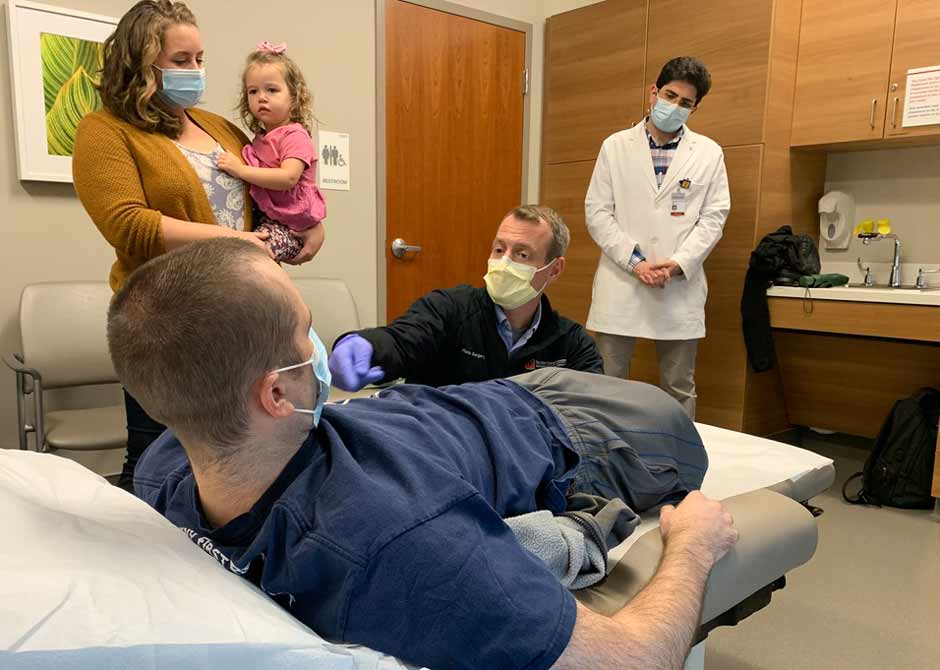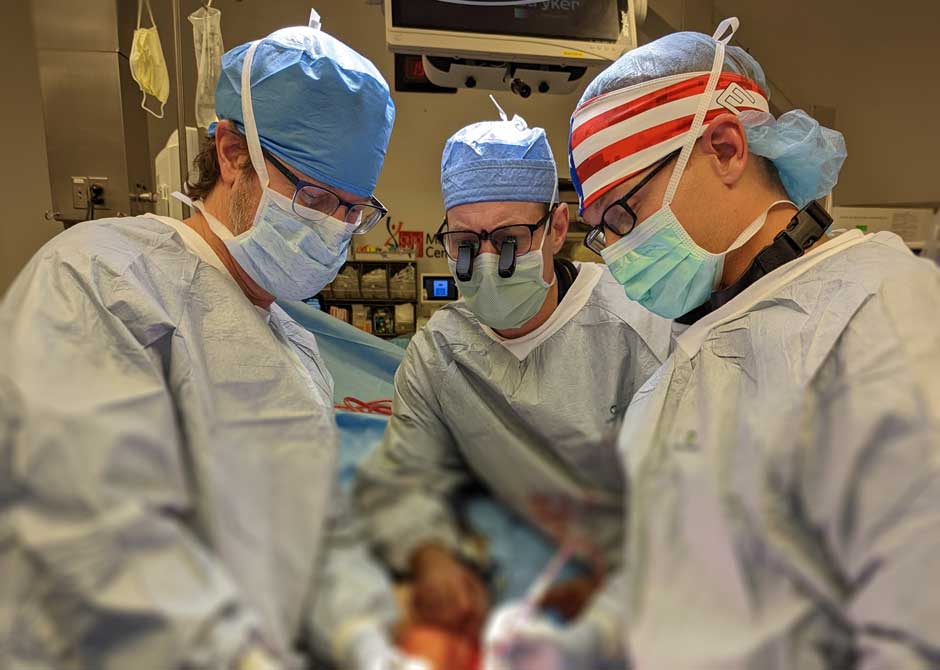 Complex problems require collaborative care. That’s why the Military Medicine Program at The Ohio State University Wexner Medical Center offers a single source for veterans to access all medical and surgical specialties.
Complex problems require collaborative care. That’s why the Military Medicine Program at The Ohio State University Wexner Medical Center offers a single source for veterans to access all medical and surgical specialties.
We not only have the infrastructure to meet all your needs in one place but also the ability to ensure clear communication and efficient care coordination.
Whether you require advanced reconstructive surgery, intensive therapy for post-traumatic stress disorder, better pain management or state-of-the-art orthopedic surgery, the Military Medicine Program is ready to understand and help find solutions to your medical issues.
Besides world-class surgeons (peripheral nerve surgeons, microsurgeons, neuroplastic surgeons, orthoplastic surgeons), our team includes experts in prosthetics, rehabilitation medicine and mental health to help you in your journey to a better quality of life.
The Ohio State Wexner Medical Center is committed to making all of these resources available to our nation’s wounded warriors in a package that is easily accessed and optimized for service members.
Common injuries we treat for veterans
No matter the severity, the visibility or the circumstances behind the injury, all service-related injuries deserve the best care our country can offer.
We have the expertise in treating a wide array of conditions to ensure service members have every opportunity to live the lives they have earned. We aim to use novel surgical techniques and team-based care to optimize function and minimize pain after trauma.
Common combat injuries and conditions we treat include:
- Debilitating nerve pain
- Fractures and non-healing fractures
- Poor function or pain due to joint damage
- Chronic wounds or scar issues
- Skin and soft tissue breakdown
- Excessive skin and tissue
- Problems with prosthetic fitting
- Bone or hardware infections
- Paralysis
- Chronic pain from joint injuries or post-amputation
Even if your medical issue isn’t listed here, you’ve still come to the right place. The medical problems we treat are vast and we know these types of battle injuries don’t always fit neatly into specific treatment categories.
We specialize in problem solving and we’ll design an individualized treatment plan that suits your needs.
 What treatments do we offer in the Military Medicine Program?
What treatments do we offer in the Military Medicine Program?
When you come to the Ohio State Wexner Medical Center for treatment for your injuries, you’ll first receive a care coordinator who will help you and your family navigate the entire process.
We’ll be with you every step of the way, whether it’s during initial consultations, scheduling surgeries or accessing resources to help pay for travel and lodging.
While we offer veterans with combat wounds a host of services, there are six areas on which we focus.
- Extremity orthopedic reconstruction – Orthopedic and plastic surgeons work side by side to treat challenging fractures, infections and limb deformities. This also includes wound care, microsurgery for hand and ankle injuries, and trauma and burn care.
- Nerve reconstruction and repair – We possess internationally renowned experts in peripheral nerve repair to help you ease pain, regain function and even preserve limbs. Many people don’t realize that there are surgical options available to help their nerve pain and disability.
- Advanced amputation – We have an Advanced Amputation Program at Ohio State that offers a range of amputation care, including state-of-the-art amputation techniques, dedicated rehabilitation and close partnerships with local and national prosthetists.
- Craniofacial reconstruction – For injuries to the skull, we have one of the premier head and neck reconstruction programs in the country. We’re also one of the only hospitals nationwide with a dedicated neuroplastic surgery program to help fix any injury in this part of the body.
- Pain management – Many veterans deal with debilitating pain daily. At Ohio State, we believe effective pain management requires a collaborative effort from multiple specialists to address pain through the use of behavioral, medical, surgical and interventional strategies.
- Mental health and suicide prevention – We view mental health as one of the key components to recovering from a combat injury. At Ohio State, we’ve created the Suicide and Trauma Reduction Initiative for Veterans (STRIVE) to provide research-based strategies to improve the mental well-being of those who have served.
Rehabilitation, recovery and other services for wounded warriors
The road to recovery doesn’t typically end with surgery and our specially trained care coordinators will ensure you have access to every service you might need throughout your journey.
Postsurgical recovery generally requires one-on-one physical and occupational therapies as well as other rehabilitative care done through inpatient and outpatient services at the nationally ranked Dodd Rehabilitation Hospital.
These therapies could include:
- Amputee rehabilitation
- Neurological rehabilitation
- Physical therapy
- Specialty hand and upper extremity therapy
Also, we want to support every service member mentally and emotionally during this time. For post-traumatic stress or particularly challenging wounds or amputations, we have several recommended support groups or personalized counseling.
Care for veterans by veterans
The Ohio State Wexner Medical Center has more than 500 service-connected staff, including some of its leaders and top surgeons.
Many team members in the Military Medicine Program have extensive experience caring for injured service members during and after their time in service. Others have dedicated their medical careers to the mission of treating our wounded warriors based on experience with friends and family members who have served.
This gives many of our health care providers the understanding of veterans’ unique experiences and needs, which can foster a very healing environment.
